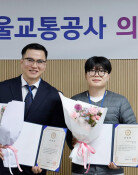[Op-Ed] Private Lessons in the Legal Sector
[Op-Ed] Private Lessons in the Legal Sector
Posted January. 14, 2009 08:06,
The Judicial Research and Training Institute, which was established in 1971, produced 32 legal experts in its first year and 49 in the second. Until 1980, the number of people passing the law bar was less than 100 a year. That figure is now 1,000 and law schools nationwide accommodate 2,000 aspiring legal experts. Though legal professionals working for courts and prosecutors have been far outnumbered by those who failed to do so due to the increasing number of students in the Judicial Research and Training Institute, preferential treatment and guarantee of status that trainees in the institute receive remain the same. Upon admission to the institute, they automatically become grade-five public officials and are promoted to grade-four after one year of training. Given that it takes around 10 years for those who have passed the national examination for grade five to reach the same status, trainees in the institutes enjoy unfair treatment.
Kim Doo-sik, a law professor at Kyungpook National University in Daegu and a graduate of the institute, described matchmakers in his book The Landscape of the Constitution. Rumor has it that matchmakers demand that a woman who wants to marry a legal trainee prepare either a building or one billion won (739,000 U.S. dollars). "Quite a few trainees married with the help of matchmakers, but not everybody married with the goal of money, Kim said in his book.
With the number of trainees reaching 1,000, the landscape of the institute has significantly changed. Of 975 trainees who completed the two-year program yesterday, 89 were appointed as judges, 88 as prosecutors, and 180 will serve as military judicial officers and public servants. The remaining 618 graduates or 63 percent will begin their legal career as lawyers, with a small number hired by law firms. As companies refrain from hiring in-house lawyers due to the economic slowdown, institute graduates will have more difficulty landing jobs this year. A newly minted lawyer trying to open his or her own practice is also a tough choice for those who lack experience.
To be appointed a judge or prosecutor or hired by top law firms, institute trainees should attain higher grades. Since several years ago, academies providing private lessons to those who passed the bar have emerged. Three trainees of the institute were caught giving lectures in those academies and their graduation has been suspended until the institute decides disciplinary measures against them. They will be punished for violating the Government Officials Act, which prohibits public officials from pursuing for-profit activities. Those disciplined include a trainee due to receive the highest grade from the Supreme Court chief justice. It is regrettable that a promising prospective legal professional has failed to abide by the law.
Editorial Writer Hwang Ho-taek (hthwang@donga.com)




![[단독]건보 가입자 40% 차지하는 2040세대, 병원 年 4회도 안 간다](https://dimg.donga.com/c/138/175/90/1/wps/NEWS/IMAGE/2025/12/21/133008933.1.jpg)


